Subtle Warning Signs Your Body Might Be Trying to Tell You Something
Our bodies are constantly sending us signals about our health, but not all symptoms are immediately alarming. While some discomforts are temporary and harmless, others may indicate underlying health issues that shouldn’t be ignored. Being attentive to these subtle changes can make a difference in catching potential problems early. When it comes to your well-being, erring on the side of caution is always a smart choice. If you notice any unusual symptoms, scheduling an appointment with your doctor is a wise decision.
Disclaimer: This content is for informational purposes only and should not be taken as medical advice. If you have concerns about your health, always consult a qualified healthcare professional.
1. Cracked Corners of the Lips
Cracked, painful, or blistered corners of the mouth can be irritating and uncomfortable. Many people experience this condition occasionally, often due to simple causes like dehydration or exposure to harsh weather conditions. In dry or windy climates, the delicate skin around the mouth can become irritated, leading to cracks. Excessive sun exposure can also damage the lips, causing them to become dry and chapped.
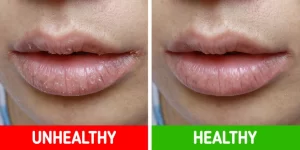
Additionally, everyday products like toothpaste, lip balm, or certain cosmetics might trigger irritation, particularly if they contain allergens or harsh chemicals. However, in some cases, cracked lip corners might signal an underlying nutritional deficiency—such as a lack of iron or vitamin B2 (riboflavin)—or even an undiagnosed fungal infection. If the issue persists despite hydration and moisturizing, it’s best to see a doctor for further evaluation.
2. Random Muscle Twitches
Muscle twitches, also known as fasciculations, can occur for many reasons. Most of the time, they’re harmless and temporary. Stress, excessive caffeine consumption, dehydration, and lack of sleep are common culprits. Strenuous exercise can also cause twitching due to muscle fatigue or imbalances in electrolytes, such as magnesium or potassium.

However, frequent or persistent twitching may signal something more serious. In rare cases, it could be a symptom of a neurological condition like amyotrophic lateral sclerosis (ALS) or multiple sclerosis (MS). Kidney disease can also lead to muscle twitching due to imbalances in calcium, sodium, and potassium levels. If the twitches are recurring, accompanied by muscle weakness, or worsening over time, seeking medical advice is recommended.
3. Wrinkly Hands and Fingers
Wrinkled hands are often associated with aging or prolonged exposure to water, which temporarily causes the skin to prune. However, if your fingers appear wrinkled without recent contact with water, it might be worth investigating.
One possible cause is dehydration. When the body lacks sufficient hydration, the skin loses its elasticity, making wrinkles more pronounced. Poor blood circulation, often associated with conditions like diabetes or vascular diseases, can also contribute to premature wrinkling of the hands. Additionally, thyroid disorders—particularly hypothyroidism—may cause the skin to become dry, rough, and more prone to wrinkles. If you notice significant changes in your skin texture, consulting a healthcare provider may help identify the underlying cause.
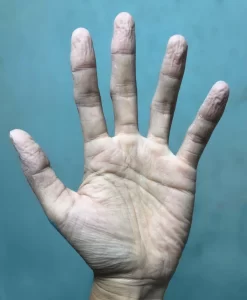
4. Constant Thirst
Feeling thirsty after exercise or on a hot day is completely normal, but excessive thirst that doesn’t go away might indicate an underlying health issue. One of the most common medical conditions associated with constant thirst is prediabetes or diabetes. When blood sugar levels are too high, the body attempts to flush out excess glucose by increasing urination, leading to dehydration and persistent thirst.

Other symptoms of diabetes include frequent urination, fatigue, and unexplained weight loss. While occasional thirst is normal, excessive and unrelenting thirst should not be ignored. If you experience ongoing thirst along with other concerning symptoms, consider getting your blood sugar levels checked.
5. Skin Rashes
Itchy, red, or inflamed skin can occur for various reasons, from allergies to infections. While many rashes are harmless and resolve on their own, some may indicate more serious conditions. For instance, eczema and psoriasis are common chronic skin disorders that cause persistent irritation.
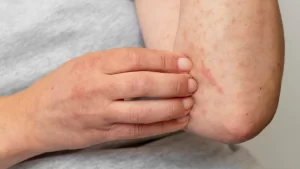
However, rashes accompanied by fever or other systemic symptoms could signal infections, such as measles, shingles, or Lyme disease. Certain autoimmune diseases, like lupus, can also present with rashes that appear on the face or other areas of the body. Even exposure to toxic plants, such as poison ivy or poison oak, can cause allergic skin reactions that require medical treatment. If a rash persists, worsens, or spreads rapidly, seeking a dermatologist’s opinion is recommended.
6. Swollen Ankles
Swollen ankles are a common occurrence, especially after standing or sitting for long periods. They’re also associated with pregnancy due to increased fluid retention. However, if swelling occurs frequently or without an obvious reason, it could indicate a more serious health concern.
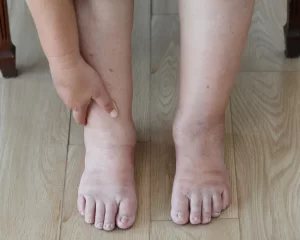
Poor blood circulation, which can result from prolonged inactivity or venous insufficiency, may cause fluid buildup in the lower extremities. Heart disease and kidney dysfunction are also potential culprits, as both conditions can lead to fluid retention. An underactive thyroid (hypothyroidism) can contribute to swelling as well. In mild cases, reducing salt intake and staying active can help alleviate symptoms, but persistent swelling should be evaluated by a doctor to rule out serious medical conditions.
7. Canker Sores
Canker sores, or aphthous ulcers, are painful lesions that develop inside the mouth, typically on the inner cheeks, lips, or tongue. They’re not contagious but can be incredibly uncomfortable, especially when eating or drinking.
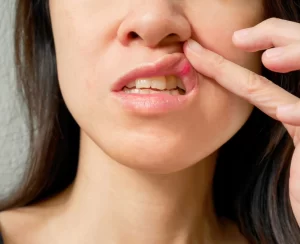
The exact cause of canker sores is not fully understood, but several factors may contribute to their development. Stress, hormonal changes, and minor mouth injuries—such as accidentally biting the inside of your cheek—are common triggers. Nutritional deficiencies, particularly low levels of vitamin B-12, folate, or iron, may also play a role. While most canker sores heal within a week or two, frequent or unusually large sores may warrant a visit to a healthcare professional to rule out underlying conditions.
The Importance of Listening to Your Body
Our bodies are constantly communicating with us, and recognizing early warning signs can prevent minor issues from becoming serious health concerns. While some symptoms may seem trivial at first, paying attention to persistent or unusual changes in your body can make a significant difference in long-term health.
Even symptoms that appear minor—such as cracked lips, muscle twitches, or mild swelling—can sometimes be early indicators of underlying conditions that need attention. Being proactive about your health means staying hydrated, eating a balanced diet, managing stress, and getting enough sleep.
If a symptom persists, worsens, or is accompanied by other concerning signs, seeking medical advice is always the best course of action. Your health is your greatest asset, and taking small steps to monitor changes in your body can lead to better overall well-being.
Would you like to explore more about your body’s hidden health clues? Be sure to check out our other article, where we discuss what your feet might be revealing about your health. Understanding these subtle signs can empower you to make informed decisions about your well-being and live a healthier life.





